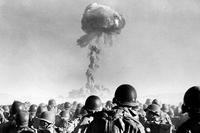Marine Cpl. John Dolezal poses with Cchaz, a Belgian Malinois, at Twentynine Palms in California. Dogs bred at Lackland Air Force Base in Texas, the military's primary canine facility, are given names that begin with a double letter.
The June 2014 issue of National Geographic magazine just came out and the cover story by Michael Paterniti is called "The Dogs of War" and takes an in-depth look at the role our canine friends play in the military. The magazine has allowed us to run an excerpt from the article, a video profile and a slideshow featuring highlights of Adam Ferguson's photography.
Video courtesy National Geographic
Excerpt:
Out in front of America’s troops, combat canines and their handlers lead the way onto the most dangerous battlefields on Earth.Here is Marine Corporal Jose Armenta in his tent on the night before getting blown up in Afghanistan. He jokes with Mulrooney and Berry and the medic the guys have nicknamed “Christ.” He feeds and waters his dog, Zenit, a sable-coat German shepherd. He lets Buyes, who will be dead in three months, ruffle Zenit’s fur, for the radioman is crazy about the dog.
Then he takes Zenit outside in the waning light of this dusty, desert otherworld to train.
They’re happiest like this. Jose has Zenit sit, which the dog does obediently, and then Jose jogs 50 yards down and hides a rubber toy, a Kong, up against a mud wall, covering it with dirt. On Jose’s command, Zenit bursts forward, zigging in search of it, tail wagging. It’s an intricate dance. Voice commands met by precise canine action, always with the same end goal in mind—to find the toy. Tomorrow, on patrol, the objective will be finding not a toy but an improvised explosive device, or IED, one of the Taliban’s most brutally effective weapons against American troops here in what many consider the most dangerous province in one of the world’s most dangerous countries. And no dog can find every bomb every time.
For the past three months Jose’s been stationed at Patrol Base Alcatraz, at the edge of a town called Sangin in Helmand Province, without a “find.” Despite his optimism—the man always beams a disarming smile—the lack of finds is beginning to wear on him almost as much as the 100-degree heat, which feels even hotter rucking 75 pounds of gear.
[photoshow]




